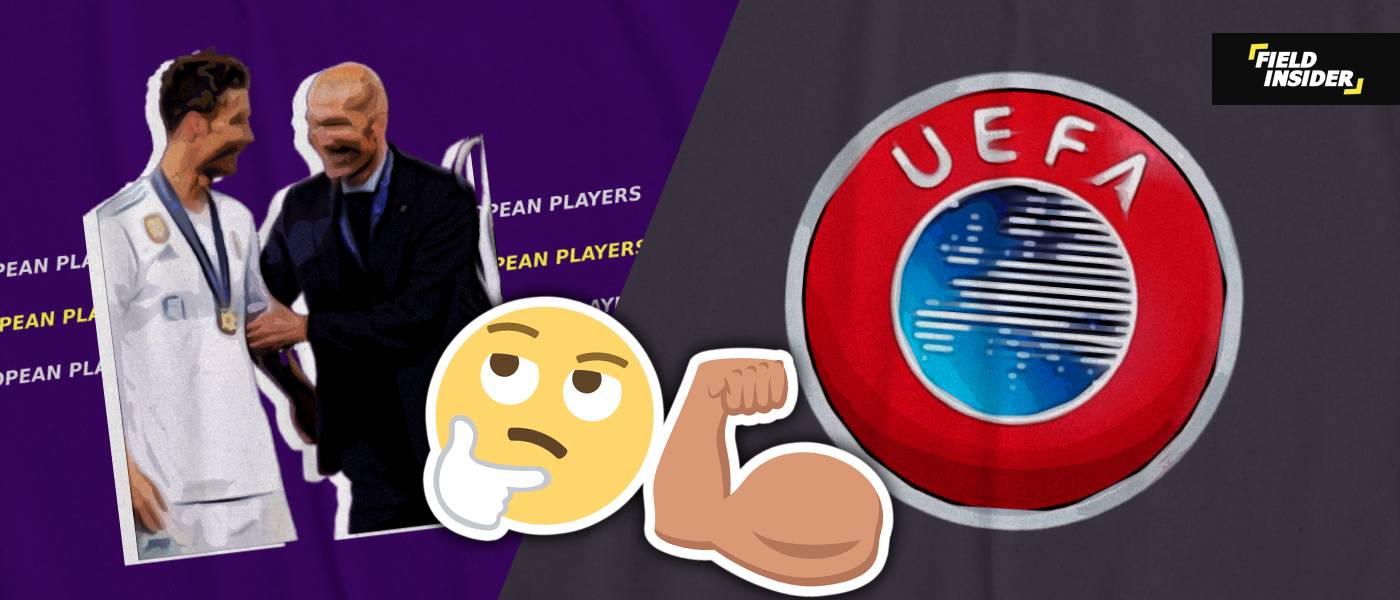Why is European Football The Best In The World?
European football is not just a game—it’s a tradition, a culture, and a multi-billion dollar industry that fascinates the hearts of millions around the globe. It’s where legends are made, and dreams are realized on the pitch under the floodlights of grand stadiums.
Key takeaways
| Aspect | Details |
|---|---|
| Historical Legacy | Europe’s football has evolved over centuries, with clubs and national teams establishing a profound historical significance. |
| International/Club Competitions | The quality of leagues like the UEFA Champions League and the English Premier League is unmatched, showcasing top-tier talent and competitive play. |
| Player Development | European academies are renowned for their ability to nurture world-class talent, contributing to a diverse and skilled player pool. |
| Financial Investment | The financial clout of European clubs allows for advanced infrastructure and the acquisition of the best global talent. |
| Global Fan Base | European football’s marketing prowess has created an extensive international fan base, further solidifying its global dominance. |
| International Performance | European teams’ success in international tournaments underscores the high level of play within their domestic leagues. |
Historical Legacy
Europe’s footballing roots reach deep into the 19th century when the sport’s first formal rules were penned. Since then, it has been a chronicle of pioneering moments! From the formation of the English Football League to the first international match between England and Scotland.
Clubs like FC Barcelona, steeped in history, have become more than just teams; they’re cultural icons representing decades of tradition. These legacies are the foundation upon which European football has built its global dominance.
Quality of iNTERNATIONAL & Club Competitions
The UEFA Champions League anthem resonates as a call to arms for the continent’s elite, each match a display of football at its peak. Similarly, the English Premier League boasts a competitive ferocity that is unrivaled.
The Italian Serie A and the Spanish La Liga each contribute their unique styles, influencing global football trends. These competitions are examples of excellence, where the relentless pursuit of glory creates legends and unforgettable moments.
The Competitions
UEFA European Championship
The UEFA European Championship, commonly known as the EURO, is a primary association football competition. Senior men’s national teams of the Union of European Football Associations (UEFA) members contest it to determine the continental champion of Europe.
Held every four years since 1960, the tournament sees Europe’s best teams compete in a month-long event after a qualifying phase that takes place over the preceding years. Ten different national teams have won the competition, with Germany and Spain holding the most titles.
The EURO is famed for its high-quality matches and has been a stage for some of football’s most iconic moments and players. It’s a celebration of European football unity and skill, attracting a global audience and fostering national pride.
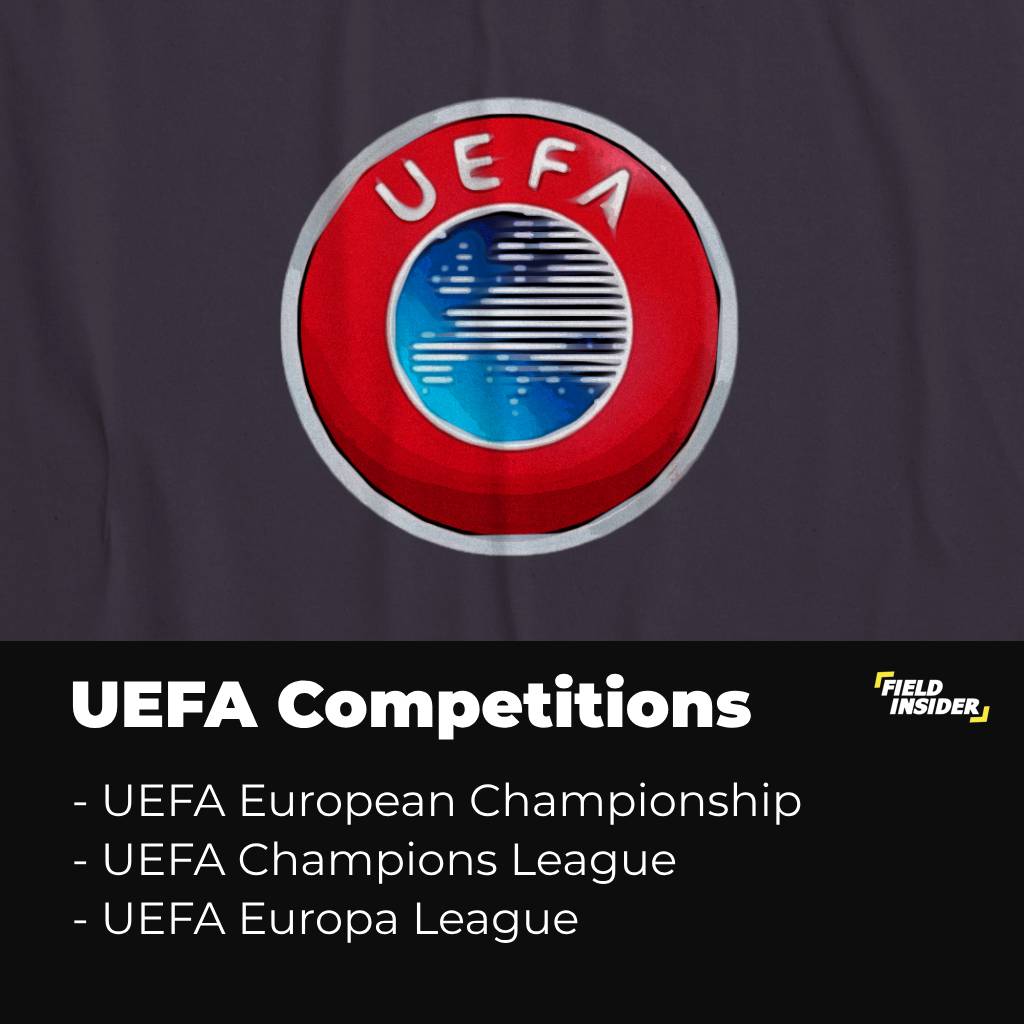
Uefa Champions League
The UEFA Champions League is the most prestigious club competition in European football, featuring the top teams from UEFA’s member associations. Established in 1955, it was initially known as the European Cup before being rebranded in 1992.
The tournament begins with a group stage, followed by knockout rounds, and culminates in a highly anticipated final. Clubs qualify based on their performance in their respective national leagues and cup competitions.
The Champions League, renowned for showcasing football at its highest level, features elite clubs and players competing for one of the sport’s most coveted trophies.
Historically, the knockout rounds have been the stage for some of the most remarkable and memorable comebacks in football history, adding to the allure and excitement of the competition.
Uefa Europa League
The UEFA Europa League, previously the UEFA Cup, serves as UEFA’s secondary club football tournament. It stands below the Champions League in terms of prestige, yet it celebrates its competitive spirit and the diverse range of European clubs it features.
Established in 1971, the Europa League includes teams that qualify through their national leagues and cup competitions, with some eliminated from the Champions League group stage also joining.
The format consists of a group stage followed by knockout rounds, leading to the final. The Europa League offers a platform for emerging talents and clubs to gain international recognition and experience at a high level of competition.
UEFA Europa Conference League
The UEFA Europa Conference League, introduced by UEFA in the 2021-22 season, is the third-tier European club football competition, sitting below the Champions League and Europa League.
It aims to give more clubs from a broader range of UEFA member countries a chance to participate in European competitions, thereby promoting greater diversity and inclusivity in the sport.
The tournament features teams that qualify through their domestic leagues’ placements and cup competitions. Its format includes a group stage followed by knockout rounds, culminating in a final where the winner is crowned.
This competition provides a valuable platform for lesser-known clubs to gain international experience and exposure.
Top European Leagues
Premier League
The Premier League, as the top tier of English football, holds a reputation as one of the world’s most competitive and prestigious football leagues. Composed of 20 clubs, it operates on a system of promotion and relegation with the English Football League (EFL).
Since its formation in 1992, the Premier League has been home to some of the world’s most famous football clubs. European powerhouses including Manchester United, Liverpool, and Arsenal.
The league is known for its intense matches, and equally passionate fanbases. Its ability to attract top talent from around the globe mainly derives from lucrative television deals and sponsorships.
La liga
La Liga, also known as LaLiga Santander for sponsorship, is Spain’s premier professional football division. Managed by the Liga Nacional de Fútbol Profesional, it features 20 teams.
Each season, the bottom three teams get relegated to the Segunda División. They are replaced by the top three teams from that division.
This league is famous for its technical and tactical gameplay. It hosts prestigious clubs like FC Barcelona and Real Madrid and has seen greats like Lionel Messi and Cristiano Ronaldo.
La Liga holds the record for the most UEFA Champions League titles. It ranks highly in Europe according to UEFA’s league coefficient. The league is known for its passionate fans, historic rivalries, and significant cultural impact in Spain and worldwide.
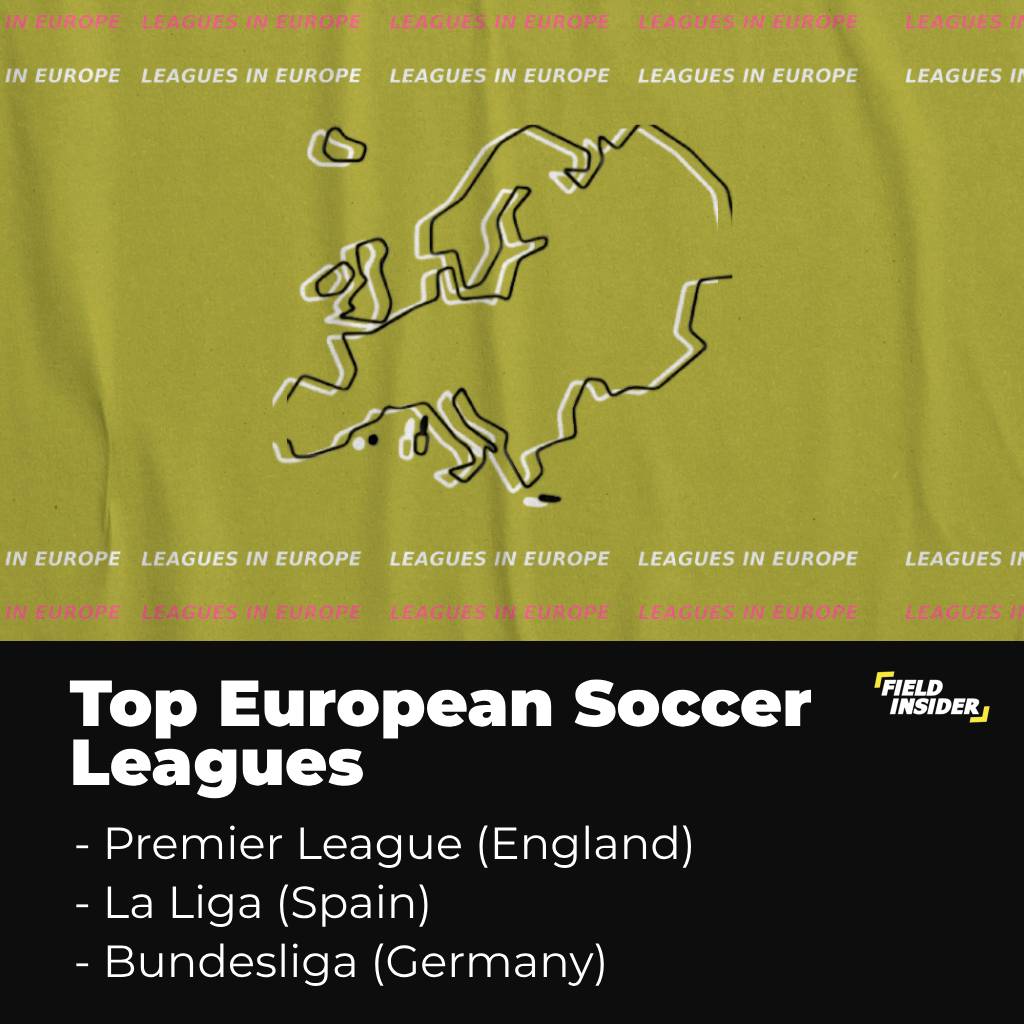
Serie A
Serie A, Italy’s top-tier professional football division, stands out in European football primarily for its defensive strength and tactical sophistication. It has served as a fertile ground for developing some of the world’s finest defenders and tacticians.
Throughout its history, Serie A has been a powerhouse in European football, with its teams often triumphing in international tournaments. The league features storied clubs like Juventus, AC Milan, and Inter Milan, and has been the stage for legendary players such as Paolo Maldini and Francesco Totti.
The league is celebrated for its enthusiastic fan base, historic stadiums, and significant contributions to the worldwide influence of football culture.
Bundesliga
The Bundesliga stands as Germany’s top professional football league, famous for its high-scoring games and nurturing of young talent. It boasts the highest average stadium attendance globally, attributed to state-of-the-art facilities and reasonably priced tickets.
The league’s quality shines on the international stage, with German teams such as FC Bayern Munich and Borussia Dortmund being staples in European competitions.
Additionally, the Bundesliga’s distinct 50+1 rule ensures that club members hold a majority of the voting rights, thereby maintaining a strong bond between the clubs, their fans, and the local communities.
MOST SUCCESSFUL CLUBS IN Major EUROPEAN CLUB COMPETITIONS
| Club | Country | Champions Leagues | Europa Leagues | Total Number of European Titles* |
|---|---|---|---|---|
| Real Madrid | Spain | 14 | 2 | 16 |
| Liverpool | England | 6 | 3 | 9 |
| AC Milan | Italy | 7 | / | 7 |
| Bayern Munich | Germany | 6 | 1 | 7 |
| Sevilla FC | Spain | / | 7 | 7 |
| Inter | Italy | 3 | 3 | 6 |
| Barcelona | Spain | 5 | / | 5 |
| Ajax | Netherlands | 4 | 1 | 5 |
| Juventus | Italy | 2 | 3 | 5 |
| Chelsea | England | 2 | 2 | 4 |
Player Development and Talent Pool
At the heart of Europe’s footballing success is its unrivaled talent pool! Carefully cultivated in world-renowned academies like those at La Masia, at Ajax and Sporting CP.
These institutions are not just about developing football skills. They’re about shaping individuals who can perform under the intense spotlight of top-tier European leagues. They develop a multicultural and diverse talent pool, ensuring that European football remains at the forefront of the sport’s evolution.
Greatest European Players Of All-Time
Some players, among other European greats, have significantly contributed to the rich history of football, each bringing unique skills and achievements to the sport.
- Cristiano Ronaldo (Portugal): Known for his incredible athleticism, prolific goal-scoring, and versatility, Ronaldo has achieved immense success with various clubs and the Portuguese national team.
- Johan Cruyff (Netherlands): A key proponent of ‘Total Football’, Cruyff was renowned for his technical skills, intelligence, and influence in shaping modern football.
- Franz Beckenbauer (Germany): Beckenbauer, known as ‘Der Kaiser’, revolutionized the role of the sweeper and was central to Germany’s World Cup successes.
- Michel Platini (France): A masterful playmaker and scorer, Platini was instrumental in France’s European Championship victory and won three Ballon d’Or awards.
- Zinedine Zidane (France): Famous for his elegance, vision, and critical goals, Zidane was a World Cup and Champions League winner with a lasting legacy.
- Alfredo Di Stéfano (Spain/Argentina): Di Stéfano, who played internationally for Spain but was born in Argentina, was a versatile forward crucial to Real Madrid’s early European Cup triumphs.
- Ferenc Puskás (Hungary): Puskás boasted an extraordinary goal-scoring record, leading Hungary’s ‘Mighty Magyars’ and excelling at Real Madrid.
- Bobby Charlton (England): A key figure in England’s 1966 World Cup-winning team, people celebrated Charlton for his midfield prowess and scoring ability.
- Paolo Maldini (Italy): Maldini, a one-club man with AC Milan, was renowned for his defensive skill, leadership, and longevity in the sport.
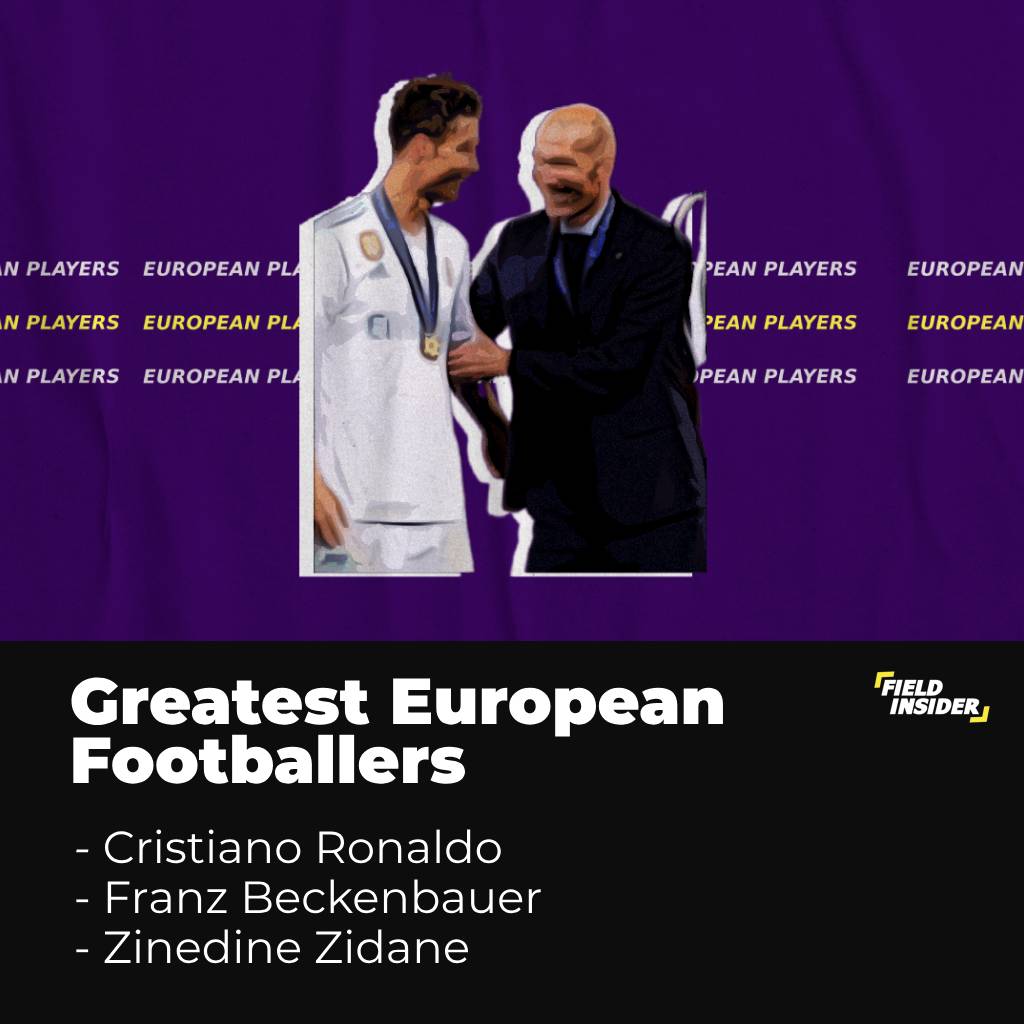
Financial Investment and Infrastructure
The financial landscape of European football is a powerhouse, with clubs commanding significant investments from global sponsors and investors.
This influx of capital has led to the creation of architectural marvels. Amongst them being, Bayern Munich’s Allianz Arena and cutting-edge training facilities that attract the globe’s finest talent. The financial might of European clubs is a testament to the sport’s commercial success and a key driver in maintaining its high standards.
Ever increasing market size of european football
Market size of European football has been constantly increasing in the last decade with year 2019/20 and 2020/21 being exception due to Covid 19 impact.
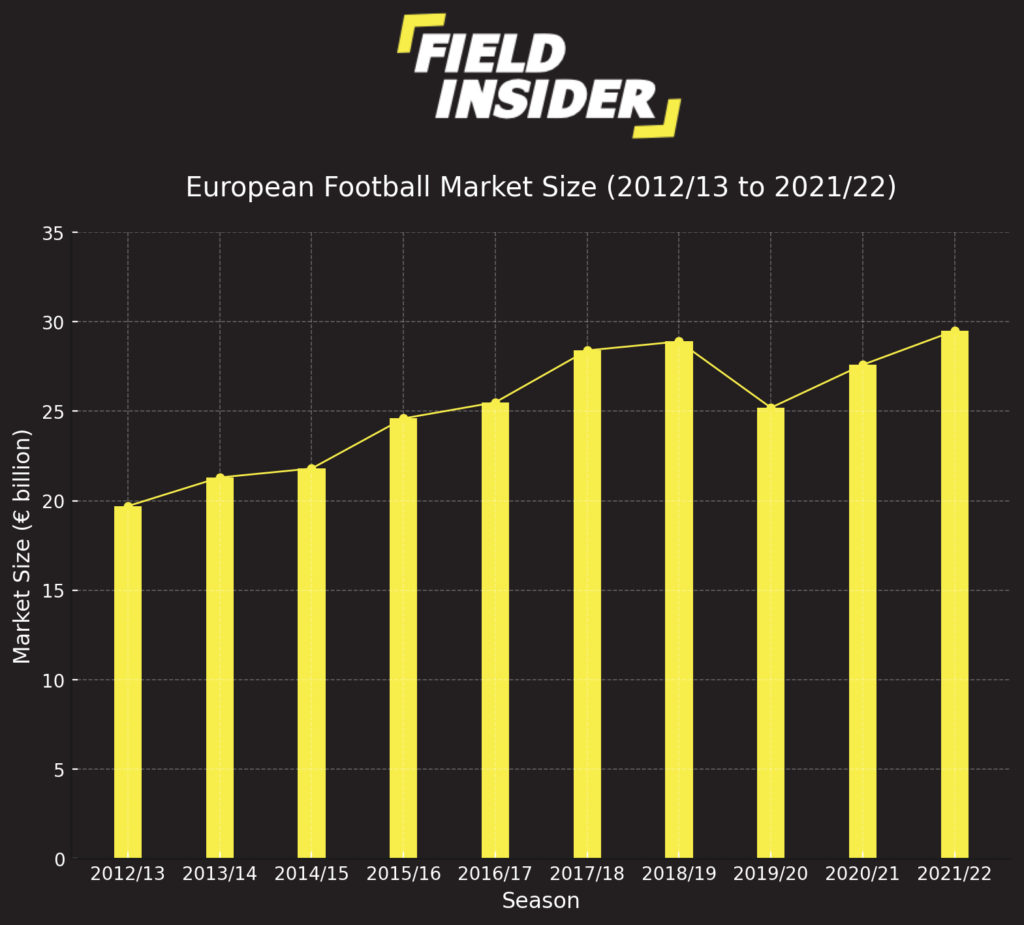
The bar chart presents a decade-long route of the European football market size. Starting with a valuation of €19.7 billion in the 2012/13 season. This figure experienced a gradual increase to €21.3 billion in 2013/14. And followed by a modest rise to €21.8 billion in 2014/15.
The subsequent season, 2015/16, saw a more substantial climb, reaching €24.6 billion. The momentum continued with the market size hitting €25.5 billion in 2016/17. The growth trend persisted, with the market reaching €28.4 billion in 2017/18 and peaking slightly higher at €28.9 billion in the 2018/19 season.
However, the 2019/20 season marked a downturn, where the market size contracted to €25.2 billion, likely due to the economic implications of the COVID-19 pandemic.
The market showed resilience in 2020/21 with a recovery to €27.6 billion. The upward trajectory peaked in the 2021/22 season, where the market size reached its zenith over the observed period at €29.5 billion, indicating a robust rebound and a new high for the industry.
Management and Organization
The strategic minds behind European football clubs are as crucial as the players on the pitch. Efficient management, from youth recruitment to match-day operations, is pivotal in ensuring a club’s success.
The organizational awareness of clubs in Europe sets a global benchmark that ensures sustained excellence both on and off the field.
Global Fan Base and Marketing
European football’s reach extends to every corner of the earth, with fans wearing the jerseys of their favorite teams across continents. This global fan base is not accidental. It is the result of strategic marketing that has turned European matches into global events.
Players rise to international stardom, and billions worldwide consume matches, making European football a unifying global language.
International Performance
When European teams take to the international stage, they often set the standard for excellence. The competitive environment within European leagues directly reflects in their consistent performance in World Cups and European Championships.
The international success of European teams reinforces the continent’s standing as the epicenter of top-tier football.
Best European International Countries (Honors)
Italy and Germany dominate the European football international stage, each boasting 4 World Cup victories. Germany have an edge in European Championships with 3 titles, showcasing their consistent prowess in European contests.
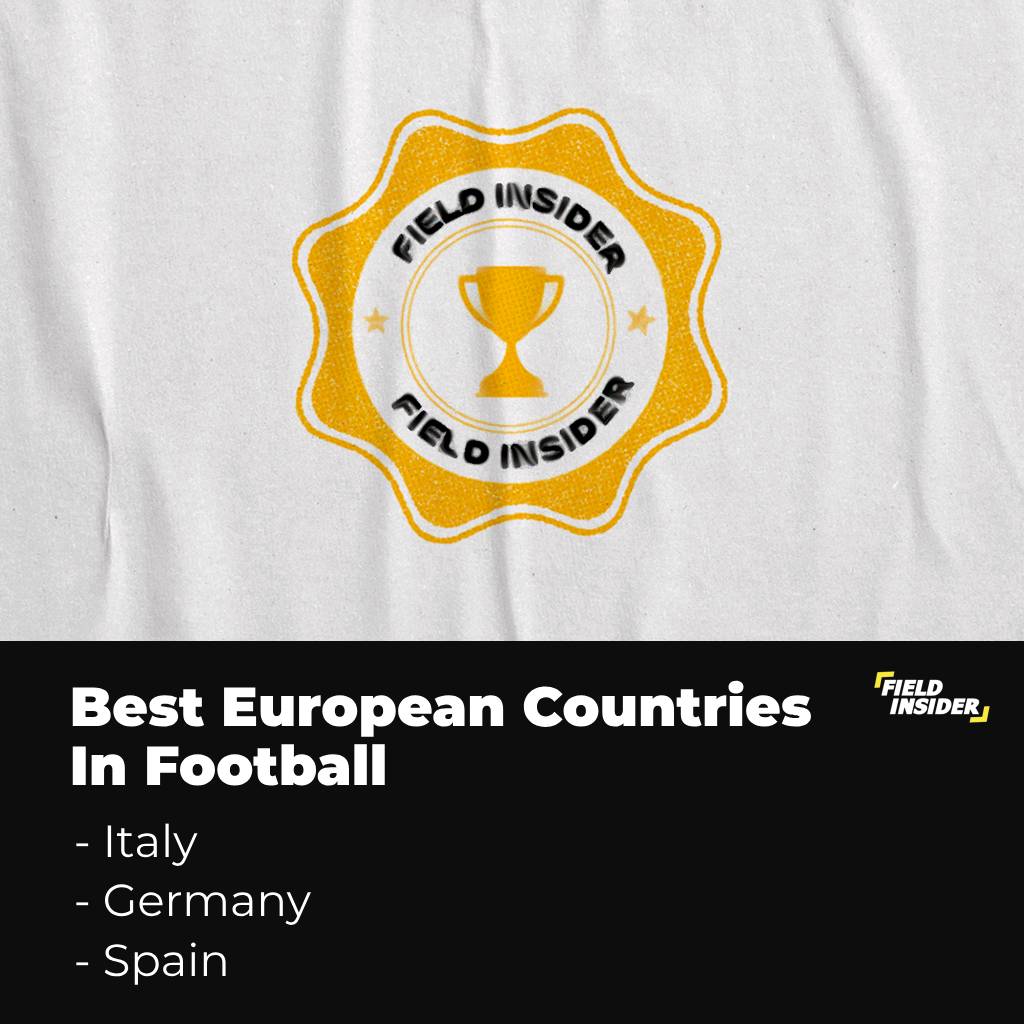
Spain, another formidable force, have secured 1 World Cup and 3 European Championships, underscoring their strong presence in international football. France, with 2 World Cup and 2 European Championship titles, also have a notable record in major football tournaments.
| Country | World Cups | European Championships |
| Italy | 4 (1934, 1938, 1982, 2006) | 2 (1968, 2020) |
| Germany* | 4 (1954, 1974, 1990, 2014) | 3 (1972, 1980, 1996) |
| France | 2 (1998, 2018) | 2 (1984, 2000) |
| Spain | 1 (2010) | 3 (1964, 2008, 2012) |
| England | 1 (1966) | / |
| Netherlands | / | 1 (1988) |
| Greece | / | 1 (2004) |
| Denmark | / | 1 (1992) |
| Portugal | / | 1 (2016) |
| Russia* | / | 1 (1960) |
| Czech Republic* | / | 1 (1976) |
Cultural Impact
The influence of European football rise above the sport itself, impacting global cultures and communities. It’s a medium through which social issues are addressed, and barriers are broken. The sport has the power to unite people, providing a sense of belonging and identity that is powerful and far-reaching.
It often serves as a platform for raising awareness and driving change on critical social issues, such as racism, poverty, and inequality. Iconic moments on the football pitch, like players taking a knee, have sparked international conversations and movements towards social justice.
The shared passion for beloved teams and players develops a sense of community and identity among fans, creating bonds that can bridge societal divides.
Conclusion
European football asserts its status as the world’s best through a blend of historical significance, competitive intensity, and a commitment to excellence.
As we look toward the future, the sport’s ability to innovate and adapt will be crucial in maintaining its revered status. The love for football in Europe is a flame that burns brightly, an alert for the sport across the globe.


